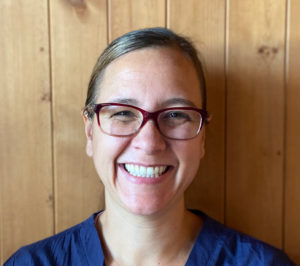Introducing: Wellness Wednesdays with Dr. Jessica Badwards
Wellness Wednesdays
| 2020 has been a particularly difficult year for everyone – especially clinicians. We want to make sure that we’re taking the time to acknowledge these challenges – and prioritize our health.
For the last several years, emergency physician Dr. Jessica Badwards, a USACS physician in Chicago, has been writing a weekly wellness newsletter for her fellow doctors and residents. Her journey into wellness began when she recognized the lack of practical wellness teaching for clinicians. As her career progressed, she has nurtured her passion for wellness and self-care and has taken on wellness leadership roles, provides lectures, and is a guest speaker on the subject. Going forward, her writings will be featured here each Wednesday. You may also visit her website, BeWellHealWell.
 About Dr. Jessica Badwards
About Dr. Jessica Badwards
Aside from being a doctor, Dr. Badwards also has four children, two cats, a banjo, an insatiable appetite for bad tv, and enjoys time at home with her family.
She speaks of wellness from her own experiences. She, too, has stress in the workplace and struggles to find the right work and home life balance. She presents the information in this website as your peer, who also strives to improve her wellness, and who would like to share the lessons she has learned along the way. We hope that you enjoy and learn from these posts.
On Difficult Days
As we’re all aware, being an emergency medicine physician is already a difficult job. It tests our patience, stamina, and intellect every shift.
Dealing with stressors in our personal lives can make it particularly hard to come in and work a shift with the same empathy and patience we would otherwise have. When you have these difficult days, here are a couple of tips to help.
- Be aware of your emotional state before you start your shift. Just simply acknowledging that today may be more difficult helps to deal with tough situations as they arise.
- Take breaks. Especially after dealing with a difficult patient or coworker, force yourself to step away. Get some air, some food. Even three minutes out of the hospital to reset will allow you to not let it affect the next personal encounter.
- We all have patients that are particularly stressful for us. During times of personal stress, it is even more taxing to care for these patients. Try to identify these scenarios, and consider asking a colleague to see these patients for the day. This is expected, we all rely on each other. We’re all human, and minimizing triggers that may stir up emotions and frustrations is part of good personal care and good patient care.
WEEKLY WELLNESS TIP
Acknowledge that our personal lives affect our work lives.


 About Dr. Jessica Badwards
About Dr. Jessica Badwards